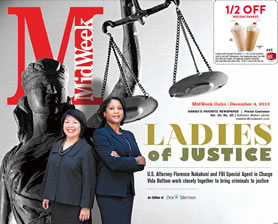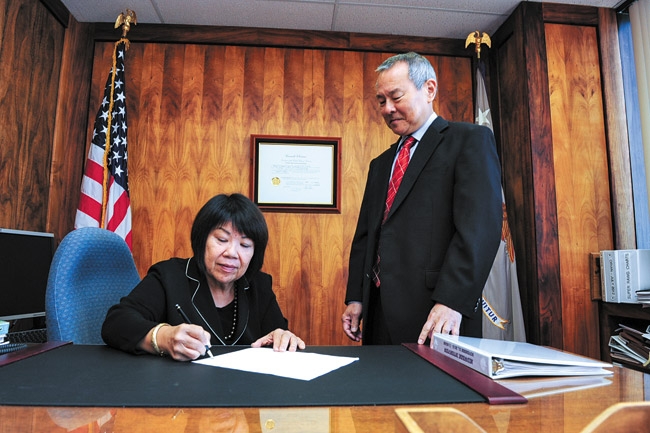Ladies Of Justice
U.S. Attorney Florence Nakakuni and FBI Special Agent In Charge Vida Bottom work closely together to bring criminals to justice
Florence Nakakuni makes a federal case out of everything. Vida G. Bottom can interrogate people to the point of intimidation. But let them be. They’re just doing their jobs.
mw-cover-120413-ladiesofjustice-3
You’d want to think twice about confronting Nakakuni and Bottom, Hawaii’s two top law enforcement officers. And don’t let the high heels and lipstick fool you. Nakakuni and Bottom can be tough as the state’s ladies of justice.
Nakakuni is our United States Attorney, appointed in 2009 by President Barack Obama to represent the government in federal court cases. Bottom is the Federal Bureau of Investigation (FBI) special agent in charge of the Honolulu field office, a position she was named to last May by U.S. FBI Director Robert S. Mueller III.
In a field dominated by men, they have excelled in establishing their capability and credibility to attain leadership roles.
MidWeek put the two ladies on the scales of justice to weigh in on their background and accomplishments. What they do in the service of our country merits the spotlight.
We meet Nakakuni at her sixth floor office in the Prince Kuhio Federal Building on Ala Moana Boulevard. Bottom is at FBI headquarters in Kapolei, a four-story building surrounded by an imposing black security fence.
Unlike the Hollywood versions of FBI and U.S. Attorney encounters, we don’t break into their offices with confrontational rhetoric and guns drawn. But we couldn’t help thinking of Al Pacino in Donnie Brasco shouting, “Freeze, FBI!”
A weapon is not part of Nakakuni’s wardrobe. If Bottom is armed, she doesn’t reveal it. Of the two, Bottom is a bit more guarded with her answers. That’s understandable, considering the FBI operates under a shroud of secrecy for national security purposes.
Nakakuni is a local girl who rose through the ranks of the court system. Bottom is a newcomer to the Islands who asked for the assignment to bask in the sun and surf of a strategically positioned office.
Nakakuni lives in a world of courtroom procedure and drama. Preparation is essential. She is well-prepared for our interview, complete with case notes. She is articulate, animated, and thorough as she answers questions.
“Women are adept at attention to detail,” she asserts.
Good, we thought. Let’s begin with opening statements.
MW: What’s your background?
Nakakuni: I grew up in Palolo, attended Kaimuki High School, and wanted to be an English teacher. I never thought I’d go to law school and become a prosecutor. I was in the third entering class at the University of Hawaii Richardson School of Law. My class reflected the community with students diverse in age, cultural and social background. Law school classmates could tell you I was the last person they ever expected to be a litigator, much less a prosecutor. Some things just turn out sometimes, right?
Bottom: I come from the Bay Area of California. I am the second youngest of five children and always had an aptitude for math and science. I graduated from University of California at Los Angeles with a degree in electrical engineering, worked in engineering for a while, but in seeking more job satisfaction, fell into government service. It wasn’t planned but it fit well for me.
MW: What was your career path?
Nakakuni: I have been a federal prosecutor with the U.S. Attorney Office in Hawaii since 1985. My legal career began as a law clerk for the late Justice Thomas Ogata of the Hawaii Supreme Court. I then worked in Washington, D.C., in the Justice Department’s Office of Information and Privacy before returning home for a stint with the Navy’s Office of General Counsel at Pearl Harbor. As assistant U.S. attorney, appointed by Daniel Bent, I served as chief of the organized crime and narcotics section, criminal division, for four years before becoming U.S. attorney.
Bottom: Before coming to Honolulu, I served as chief of the public corruption and civil rights section at FBI headquarters in Washington, D.C. I have been a special agent since 1989 assigned to San Diego, where I worked on white collar crime, organized crime and violent street gang cases. In 1998, I transferred to San Francisco to investigate government fraud and anti-trust violations. Three years later, I became supervisory special agent in the government fraud and public corruption unit at FBI headquarters.
As assistant special agent in charge of the Los Angeles division, I managed white collar crime, public corruption, forensic accounting and victim assistance programs from 2009 to 2010.
The Hawaii assignment? Oh, I requested it. I love the sun, sand and lifestyle here.
MW: As females in your posts, do you bring any special qualities to the job?
Nakakuni: If that distinction somehow makes the road easier, either for a man or woman, it’s worth being a role model. It is attainable.
Bottom: People might say women are trailblazers in a male-dominated organization, but it doesn’t have any particular advantage. The goal is to get the job done independently of gender.
MW: What’s the mission of your office?
Nakakuni: Our primary mission is to enforce federal law and defend the legal interests of the U.S. We are the principal litigators for the federal government.
Bottom: We’re responsible for protecting the country. The Bureau has a series of priorities, including protecting the country from terrorism, counterintelligence and cyber threats. Those are the top three national threats. Corruption, civil rights and transnational organized crime are also part of our mission.
Each field office assesses its priorities. With a large military footprint in Hawaii, the threat is probably greater for foreign agents trying to gain access to national defense secrets.
MW: Any notable cases you can tell us about?
Nakakuni: As assistant U.S. attorney, I prosecuted United Public Workers labor leader Gary Rodrigues for fraud and embezzlement, and former labor representative Oliver Kupau, convicted of illegal gambling and money laundering in 2002.
In national security, there was the case of Maui resident Noshir Gowadia, found guilty of selling military secrets to China.
Large criminal organizations, such as the USO prison gang, have been charged on federal indictments. More than a dozen members of a family ran a crime ring from behind bars, involving dealing drugs to stealing thousands of dollars from the IRS to fund their operation. They were charged under the RICO statute (Racketeer Influenced and Corrupt Organizations Act).
Recent cases with big sentences include the conviction of a British child molester given 30 years in prison after federal authorities discovered pornographic videos, photographs and written materials in his luggage at Hilo Airport in August 2008. A Big Island man was sentenced to 20 years in prison after attempting to distribute crystal methamphetamine through the mail.
Drug cases account for 50 percent of the cases filed in federal court. Ninety percent involve meth, or ice. Most come in from Mexico, via California or Nevada, and are transported by U.S. mail, parcel courier, human courier or car shipments. There is more meth available today that’s cheaper and purer, making it more addictive and readily available to kids. It’s a real danger.
Our federal courts also handle white collar crime cases, such as ponzi schemes, civil torts such as medical malpractice, employment discrimination, tax and bankruptcy filings.
There are hundreds of cases on the books each year, and our staff of 56 with 24 attorneys handles the full range of them, working with local and federal law enforcement partners.
Bottom: The partnership between the FBI special agent and an assistant U.S. attorney begins at the onset of every criminal investigation and continues through sentencing. The FBI agent sits shoulder-to-shoulder with the prosecutor in court at criminal trials. The lawyers count on the agents to have a firm grasp of the mountain of evidence in every case.
An example of our joint effort was the recent case of two Maui residents who were found guilty of conspiracy and mail fraud arising from a debt elimination scheme between 2008 and 2009. The investigation was conducted by the FBI, Internal Revenue Service, U.S. Postal Service, and Maui Police Department.
MW: What’s trending in your field?
Bottom: The events of 9/11 changed the world. The Bureau has transitioned to more intelligence-driven investigations. While we’ve always done it, 9/11 formalized the process.
Our personnel – of whom there are 36,000 in the overall FBI force including 14,000 agents and 3,000 analysts – are specialists in evidence recovery, computer forensics, tactical support and crisis response, bomb recovery and analysis, hazardous materials and language translation.
MW: How do you measure success and how are you accountable to the people?
Bottom: We can measure success in metrics – how many indictments, etc. – but there is also being accountable through community impact. Are our communities safer? We’re here to help citizens. The FBI might have a mystique that it is unapproachable, but we live in this community and we’re part of it.
Nakakuni: Community outreach is an important part of what we do. The Weed & Seed program established by the Department of Justice in 1991 is a community-based, multi-agency approach to reducing crime in target areas. Crime is not just a law enforcement issue. We have a responsibility to address deterrent as well.
The ladies of justice seem to balance the scales just right.







